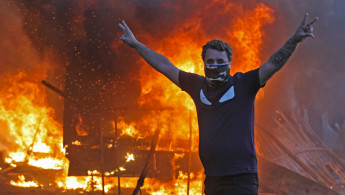Internet back in Iraq provinces amid crackdown on anti-government protesters
Internet has been restored in the Iraqi provinces of Baghdad, Basrah and Emara after a government crackdown on internet and social media.
On Wednesday, Iraq blocked popular social media networks, including Facebook and Twitter, as protests against government corruption raged into their second day.
By Thursday, 75 percent of Iraq's internet had been blocked.
NetBlocks, an observer monitoring official blocks on websites and social media networks, said that Iraq had blocked most major social media sites and apps as of Wednesday afternoon.
Facebook, Twitter, WhatsApp, Facebook Messenger and Instagram have all been blocked, according to NetBlocks.
While an AFP correspondent contested the verdict that the government had blocked social media sites - alleging instead that bandwith restrictions had slowed access to such sites - activists reported that the only way to access social media on Wednesday afternoon was through a Virtual Private Network (VPN).
VPNs are an encrypted connection that allow users to bypass internet blocks.
Protests rage against corruption
Thousands of Iraqis took to the streets of Baghdad and other cities in the country's south on Tuesday, voicing a range of grievances, including state corruption, failing public services, unemployment and the sidelining of a popular Iraqi general last week.
Protesters were met with tear gas, water cannons, and live and rubber bullets, leaving around 200 people injured and three dead.
Heavy gunfire could be heard into the night.
The violence drew condemnation from President Barham Saleh, who urged "restraint and respect for the law".
|
|
"Peaceful protest is a constitutional right granted to citizens," Saleh said late on Tuesday.
The UN's top official in Iraq, Jeanine Hennis-Plasschaert, also expressed "grave concern" on Wednesday, saying she "deeply regrets the casualties".
She urged the authorities to "exercise restraint in their handling of the protests".
Iraq's parliament has ordered an investigation into the violence, and its human rights committee has criticised the security forces for their "suppression" of the demonstrations.
Despite those concerns, security forces locked down Baghdad's central Tahrir Square on Wednesday in anticipation of further protests.
Riot police responded to demonstrations in Baghdad and southern Iraq with tear gas and by firing live rounds into the air.
"I came out today in support of my brothers in Tahrir Square," Abdallah Walid, a protester in Baghdad's Zaafraniyah suburb, told AFP.
"We want jobs and better public services. We've been demanding them for years and the government has never responded."
A protester was shot dead in Nasiriyah, southern Iraq, while another three protesters and 11 members of the security forces were wounded in Dhi Qar province, health officials told AFP.
Unconfirmed reports indicated as many as 100 people had been injured in Wednesday's demonstrations.
Spontaneous action
The demonstrations are considered unusual in recent Iraqi political history, as they appear to be spontaneous rather than having been called for by a particular political faction.
"The demonstrations that erupted in Baghdad and the rest of the provinces were popular among young people, who felt injustice and felt humiliated during the demonstrations that preceded," Wathiq al-Hashemi, head of the Iraqi Institute for Strategic Studies, told The New Arab's Arabic service.
"The Sadrists [supporters of Shia cleric Muqtada al-Sadr] and the Communist Party believed that demonstrations in Iraq could only happen through them, but yesterday's demonstration, and the large numbers of people that participated, pulled the rug from under their feet," he explained.
"There are political parties and others which will try to ride the wave of these demonstrations."
Former MP Shorouq al-Abaiji told The New Arab's Arabic service that the protesters were the "natural result of the failure of the Iraqi political system to achieve the most basic demands of the people".
"The demonstrators are poor people, young people, and there is no political movement that drives these protests," she said. "[They] were subjected to a lot of violence... the repression and violence against the demonstrators will increase... until their demands are me."
Follow us on Twitter: @The_NewArab





 Follow the Middle East's top stories in English at The New Arab on Google News
Follow the Middle East's top stories in English at The New Arab on Google News


